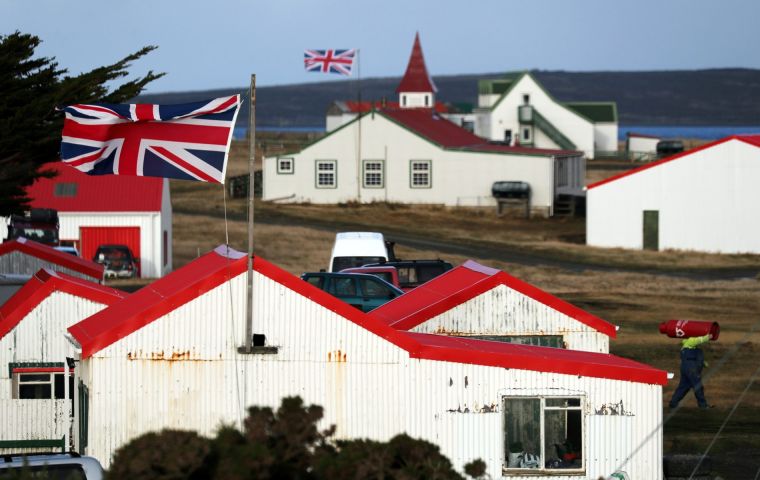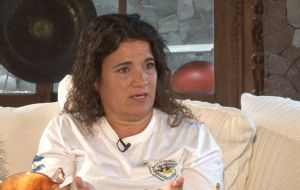MercoPress. South Atlantic News Agency
“If you want to be respected when visiting the Falklands, we must respect the Islanders”, Malvinas Families president
 The Falklands government recently approved the framework guidance to assess a “prohibited person” visiting the Islands
The Falklands government recently approved the framework guidance to assess a “prohibited person” visiting the Islands  Ms. Araujo insists that Malvinas Veterans “must understand that this privilege has full meaning by helping the families of those who were their pals, to be able to visit the graves”
Ms. Araujo insists that Malvinas Veterans “must understand that this privilege has full meaning by helping the families of those who were their pals, to be able to visit the graves” The recent approval by the Falklands' elected government of a framework guidance for assessing when a visitor should be considered a ‘prohibited person’, can be considered an effort to address disappointing past experiences and a long-standing debate in the Islands.
However contrary to other initiatives, the announcement did not have the usual jingoistic repercussion in the a currently anomic Argentina, but rather allowed reasonable reflections to surface.
“If we want to be respected when we travel to the Islands, particularly the families of the fallen with their remains at the Argentine cemetery in Darwin, we must respect the locals, the Islanders.”
The statement belongs to Maria Fernanda Araujo, president of the Malvinas Families Commission who in an interview was quite clear about the need for an adequate behavior when visiting the Falklands, respecting the local community, and her advice was made extensive to the Veterans.
”It is well known that displaying an Argentine flag or flying it in any part of the Islands, or even exhibiting signals, symbols identified with Argentina are taken by the local community as something aggressive“, said Ms Araujo adding that if visitors want to be respected in the Islands, ”then we must begin by respecting the Islanders“
The approved framework guidance to assess a ”prohibited person“, is defined as using writing, preaching or several other methods to express views which provoke, justify or glorify violence, cause harassment, alarm and distress that impacts public order, or foster hatred which might lead to community unrest or violence.
Ms Araujo insists that Malvinas Veterans who were lucky to return home from war, ”must understand that this privilege has full meaning by helping the families of those who were their pals, to be able to visit the graves.“
The president of the Malvinas Families also recalled that there are agreed rules for those visiting the cemetery, ”agreed between the Families and local authorities.”
“Displaying an Argentine flag above waist height or flying any symbol which can be interpreted as a political gesture, exceeding the humanitarian spirit, we have been asked to avoid it, even inside the premises of the cemetery. And we have understood it and accepted it.”
The fact is that the acceptance of the Argentine fallen to be buried in the Islands territory and that family members could visit their loved ones' graves, “is something which has evolved with time. Following the war rejection was most strong. In effect a public opinion poll published in the Daily Express in 1984 showed 45% of the Islanders were point blank against families' visits, 45% accepted them and 10% did not have an opinion on the issue.
However nowadays, ”there is a remarkable respect and acceptance, but under certain rules.“
Ms Araujo points out that on each humanitarian trip of the Families Commission, ”the Islanders' community take most care of all details related to our needs, profoundly human, which is to visit the place where our beloved are buried. The Argentine military cemetery at Darwin looks very tidy and this is mainly because of the respect Islanders have, both from the local government and the overall community. Even the British armed forces have always paid their respects and honors to those who were their enemies back in 1982.“
Finally Ms Araujo makes an appeal to all those who because of their behavior might imperil that families can continue visiting the cemetery and loved ones.
”I would like that each Malvinas veteran, or anyone who travels to the Islands, to think before and ask himself a very simple question, what would a soldier who did the ultimate sacrifice out of love for the Fatherland want?, most surely he would say make everything possible so that his family can continue of visit him. It's his tomb, it's his Cross.”
The president of the Malvinas Families is sister of Elbio Eduardo Araujo, an Argentine 1962 Class conscript who fell in combat at Mount Longdon the night of 11 June, 1982, a couple of days before the Argentine invading forces surrendered to the British Task Force.




Top Comments
Disclaimer & comment rules-

-

-

Read all commentsThink, I just want a clean conversation, racial slurs don’t help anyone, in fact it hurts your own argument.
Oct 11th, 2020 - 02:22 pm +8And to Gulliote, Freedom of Expression is different to Freedom to Offend
But we don’t want to claim more of Antarctica, what does claiming ice have to do with anything? Argentina and Chile claim parts of British Antarctica yes, but does Chile make a fuss? No, because it’s a non-issue
Oct 10th, 2020 - 07:22 pm +7I haven’t been condescending you, I’ve stated clearly that I wanted freedom around the globe, letting the people on the Falklands decide their future is fundamental to it.
Oct 11th, 2020 - 07:13 pm +7Are you saying because they are British by ancestry that they cannot have a voice of their own? That they must be taken over by a country with a completely different way of life? Would you like it if the British, now, don’t give me bullshit about the empire, I am talking now, would you like it if the British government invaded your country and told you “You have to speak English and accept our way of life” of course you wouldn’t accept it, so why do the Falkland Islanders have to accept Argentina’s imperialism...?
Commenting for this story is now closed.
If you have a Facebook account, become a fan and comment on our Facebook Page!